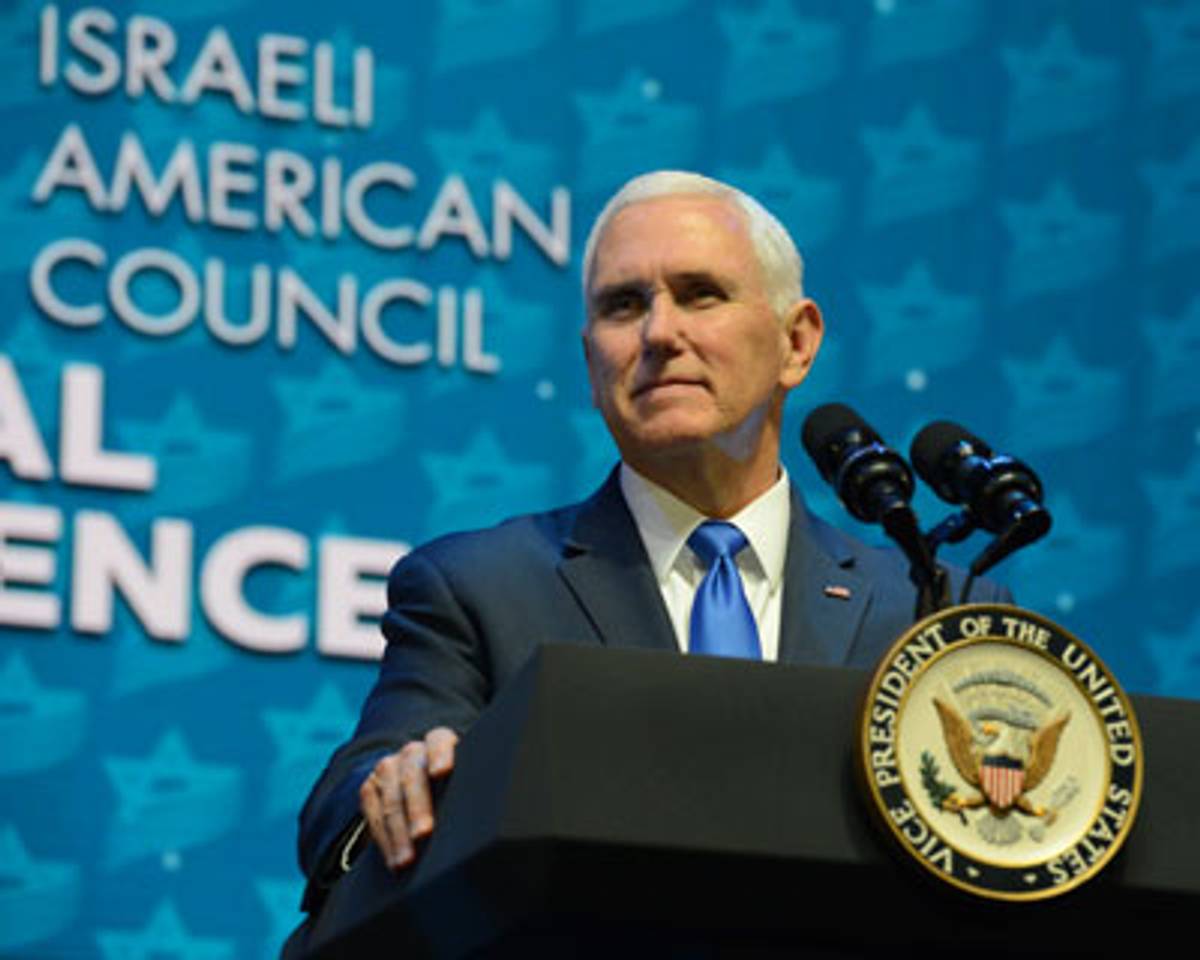The American Israel Public Affairs Committee’s monster of a yearly conference takes place at the Washington Convention Center. AIPAC’s chosen venue is a Metropolitan Museum-size netherworld of terrifyingly large ballrooms that’s hundreds of miles from the nearest naturally growing palm tree. Fortunately for the 3,000 people in attendance, the Diplomat Beach Resort in Hollywood, Florida—site of the annual Israeli-American Council meetup this past November—is very much not the Washington Convention Center. “We have our uniqueness—we’re bilingual, our connection to Israel is not based on politics,” IAC founder Shoham Nicolet explained, as spumy white waves lapped an eggshell shoreline just beyond the windows of the conference room where we were meeting. Over the course of the weekend, I would marvel at how the Diplomat’s lobby bar is ingeniously designed so that half of it is outdoors, adjacent to the upper pool deck and a short, tastefully landscaped walk from the much larger and palm-forested lower pool deck.
The setting here in Florida wasn’t the only departure from a typical pro-Israel gathering. AIPAC’s annual Policy Conference—the event against which every other such meeting is inevitably measured—is a gripping psychodrama on a scale scarcely imaginable to those who have never witnessed it. After a day at AIPAC one has no trouble identifying the organization’s anxieties. The conference reveals who the pro-Israel community thinks it needs to reach—namely Democrats and progressives, who are increasingly concerned with Israel’s human rights record and alleged recalcitrance toward the peace process—while the more left-wing politicians in attendance often drop subtle but detectable hints as to the organizers’ prospects for success. Many of the 20,000 attendees are experienced activists with a sharply calibrated sense of where things really stand, and the “mood” at AIPAC is often pointed to as an unscientific yet nevertheless broadly recognized bellwether for the health of the pro-Israel cause.
The mood at the IAC conference was downright buoyant and untroubled by AIPAC-type soul-searching. There were no paeans to Druze IDF officers or Arab doctors, perhaps because there were no skeptics in attendance in need of convincing. “What is unique about us is that we love and support Israel without any conditions … We understand that we are there to strengthen it, not to weaken it,” explained Adam Milstein, a Haifa-born real estate investor and IAC’s board chairman. Milstein, who also sits on the board of StandWithUs and Hasbara Fellowships, is seen as a leading institutional supporter for more confrontational approaches to pro-Israel activism.
The conference was a glimpse into what the politically engaged Israeli-American community looks like, and at how it contrasts with the Jewish-American mainstream. At the Thursday night opening plenary, I sat between a founder of a moving company in Washington, D.C., and a survivor of the Entebbe hostage crisis. Nicolet introduced IAC as “a new chapter in the Jewish story”; in a video clip, Sheldon Adelson, the casino tycoon and Republican donor who has given some $73 million to IAC—and who reportedly broke with AIPAC in 2008 over its support for the peace process—predicted, “If we get together, we can have the strongest Jewish group outside of Israel.” The actual highlight of the evening was a nearly two-hour performance from Israeli icon Yehuda Poliker, who had brought along a 10-piece band with backup singers and multiple percussionists and played as if to prove that he’d never mail in any performance.
The moving man filled me in on Poliker’s career. His parents were Auschwitz survivors from Greece, where some 80 percent of the Jewish population perished during the Holocaust—Poliker is an expert bouzouki player, and he has created a Greco-Israeli, Jewish-inflected acoustic gypsy punk hybrid practically unprecedented in global popular music. Before that, Poliker was the swaggering frontman for the beloved rock band Benzene and was seen as one of the era’s paragons of Israeli masculinity: “In the ’80s, he was for me what a macho man was supposed to be like. Sweaty, bearded, big guy … he was like a Viking.” In 2010, Poliker came out as gay. “He messed up my whole way of looking at things. Anybody can be anything!,” he said wryly.
In the Diplomat’s main ballroom, Poliker ripped through the Greek-flavored “Aleko” and the soaring “Hofshi Zeh L’Gamre Levad,” an energetic mid-’80s hit. Many of the people grooving next to the stage appeared to know every word to a song most American Jews wouldn’t even recognize.
Israeli-Americans have always been thought of as aloof from America’s larger Jewish community. IAC puts the population size at around a half-million; if they’re correct, it would mean roughly 10% of American Jews now trace some kind of Israeli ancestry. They are, in many respects, markedly different from the other 90-plus percent. Israeli-Americans are immigrants from a distant Middle Eastern country that for reasons of fetishism or alienation or sheer psychic and geographic distance, many of their American co-religionists barely understand. “Israelis tell themselves a different story than American Jews do,” Lior Haiat, Israel’s consul general in Miami, said during one panel discussion. As Jewish Agency chief and former Knesset opposition leader, Isaac Herzog, put it during one conference event, “It’s clear to all the Israelis in the room that living in Israel and living abroad, your priorities are different.”
IAC was founded in 2007, under the name Israeli Leadership Council. As Nicolet explained, the group exists because Ehud Danoch, Israel’s consul general in Los Angeles, was concerned that the Israeli-American community had been absent from efforts to support Israel during its war with Hezbollah the year before. “We were disconnected from Israel and disconnected from the Jewish community,” recalled Nicolet, who was the chief marketing officer for a network of real estate financing companies at the time of the group’s founding. “We lived in pockets basically. We didn’t have a community.” The first few annual conferences were held almost entirely in Hebrew—one of the only people addressing the proceedings in English was Adelson, who is married to a Tel Aviv–born physician, the recent Presidential Medal of Freedom recipient Miriam Adelson.
In the early days of the organization, Nicolet said, the Israeli government “didn’t really look at Israelis [living abroad] as an asset. They looked at them more as a problem that they need to fix, since all the Israelis should be living in Israel.” That attitude is changing. On the Saturday night of the conference, Israeli President Reuven Rivlin acknowledged in a video message that “there’s no reason to shut our eyes and ignore modern life which requires movement and multiple identities … But we must also remember where we came from and our unique heritage.” He ended with a singsongy l’hitraot, perhaps appealing to the widely held idea that the vast majority of Israeli emigrants harbor a deep desire to return home.
But at another plenary, Knesset Speaker Yuli Edelstein broached a once-taboo topic, saying that the right of expatriate citizens to vote in national elections was “something very basic” that American and French citizens living abroad enjoyed, while Israelis did not. Overseas voting would transform Israeli politics, signal an official tolerance of the reality of emigration, and eliminate one of the major formal incentives for Israelis to actually live in Israel. Whatever Edelstein’s intentions in raising the topic, Israeli-Americans are now both permanent and important enough to be pandered to.
And not just pandered to by Israelis, either. Vice President Michael Pence traveled 900 miles from Washington to address this particular immigrant advocacy group. The VP’s speech was fan service in the way that pro-Israel oration among American elected officials tends to be, but Pence also adjusted his message to his audience. “Jewish people are one of the most vibrant threads in the American fabric, and that includes the half-million Israeli-Americans who now call this country home,” Pence said, echoing IAC’s figure for the community’s size. Pence also decried Airbnb’s decision to ban listings in Israeli settlements in the West Bank. The new Airbnb policy, announced last November after a long pressure campaign bankrolled by, among others, the Rockefeller Brothers Fund, has been a target of IAC advocacy and was discussed frequently throughout the conference.
“He gave us such respect,” Milstein gushed to me afterward. “Look at the details that he took to learn about us because he feels we’re a very important community that can make an impact not just on the Jewish community but even bigger than that … I haven’t seen any Israeli leader giving this speech. It was just phenomenal.”
Vice President Mike Pence at the IAC meetup, 2018 (Photo: Peter Halmagyi)
The experience of an Israeli-American is remarkably foreign to that of your standard-issue American Jew, who regardless of their specific background or religiosity has in all likelihood never faced the certainty of military conscription or made the decision to leave the country of their birth. At the same time, Israeli-Americans aren’t really so different. They worry about assimilation and rising anti-Semitism and BDS. They are concerned with the well-being of their country of origin and want a distinct and separate political voice in the mold of other ethnonational American constituencies. The mere existence of IAC and its glitzy beachside conference visited by the most powerful politicians in the country and funded by a major political donor shows how Americanized the Israeli community is becoming.
Israelis come to the United States for the same reasons immigrants of other nationalities do. They immigrate for opportunities that they couldn’t get in a small country, or to have an adventure for a couple of years, or because they want a break from some of the chaos and relative backwardness of their birthplace. Many Israeli-Americans continue to insist against all evidence that theirs is a transient community. “We have a joke that the Israelis that are living in the U.S. can be split into two groups: Those that came for two years and those that came for three years,” said Eyal Zimlichman, the chief medical officer at the Sheba Medical Center in Ramat Gan. “Almost nobody comes and plans to stay for life.” More than once, a latent desire to return home—even if it’s never acted upon—was suggested to me as one of the key differences between Israeli-Americans and other immigrant groups. “We see coming back to Israel as a success in many ways,” said Zimlichman. Israeli-Americans who go back don’t think of themselves as having flunked out of their new country. Zimlichman himself spent five years in the U.S. going to graduate school and working in hospitals in the Harvard University system, but returned to Israel to continue his career at Sheba.
The Israelis that stay in America stick around for reasons that aren’t so unique, either. Tami Galanos, a conference attendee and an Israeli immigrant now living in New Jersey, explained how, from afar, living in Israel is a daunting prospect for people intimately familiar with how hard life can be there compared with the routine comforts in the U.S. Moving from the U.S. to Israel, “You’d go from a big house to an apartment and suddenly the weekend is only one day.” The cost of living is high, and psychic and physical space is at a premium. From the outside, “everything sounds threatening. Everything sounds stressful … how are you going to live? The way of life is very hectic.” America offers Israeli immigrants too good of a deal for them to leave, and as a result, the proverbial two or three years in the U.S. ends up lasting much longer. Still, Galanos said she is “itching to go back,” even if that return trip might be far in the future. In Israel, she added, “people don’t see living there as a Jewish commitment as we do from afar. I never thought of it that way before I left.”
In an earlier era, the tenuousness of the Zionist enterprise would have made something like the IAC conference much thornier. During his first stint as prime minister, Yitzhak Rabin referred to post–Yom Kippur War emigrants as mapolet nemshut, a term that literally means “a rock slide of small people” but carries a spitefulness that eludes literal translation. Rabin later expressed some regret about saying what could not be unsaid, and what many Israelis not-so-secretly believed: that emigrants were traitors to a higher cause and that the country didn’t need them around anyway.
The shifting view on yerida, or emigration, is arguably a sign of increasing Israeli normalcy. The Israeli state is ideologically committed to the idea that Jews should live in the country, at least in theory. But the IAC conference demonstrated that in practice, Israelis no longer view themselves as immune from the broader factors that drive people around the world to build lives outside their country of birth. Israeli decision-makers now seem to approach emigration and immigration from a position of confidence and security. “When people go and don’t come back it always hurts my heart, but we are over that age of being judgmental,” Herzog said during a panel discussion. He refused to say whether aliyah is better than community building in the diaspora, from the Jewish Agency’s perspective: “We have to attend to all the needs.”
Such an attitude might reflect an unromantic notion of Israel’s mission, especially coming from the head of an organization that helps facilitate Jewish immigration to Israel. But the official relationship to emigration was one of many signs of how demystified Israel has become even in its own eyes. “Israeliness” was once a controversial shorthand for an Israeli identity whose meaning wasn’t primarily rooted in Judaism; at IAC, the term was everywhere, to the point that the conference’s tagline was, “Israel in our hearts, Israeliness in spirit.” One Israeli decision-maker at the conference confided that “when Pence says 500,000 Israelis in America, it’s a sad thing.” Ambivalence toward celebrating Israelis living abroad obviously didn’t stop this person from traveling to Florida to meet the Israeli-American community’s representatives. The Israeli diaspora isn’t a source of open national anxiety or shame. Like Israeliness, a formerly nagging insecurity is now treated as something positive. “We all know that really Israel was formed as opposition to the diaspora,” Nicolet said. “Today we understand that Zionism is something else. Zionism accepts the fact that you have a Jewish state and you have Jewish people that support this Jewish state.”
There are multilayered ironies in there now being a diaspora of Jews descended from a country originally aimed at reversing the Jewish diaspora. And that second diaspora is living out a process of acculturation and assimilation in America that is broadly similar to the one lived out by previous generations of diaspora Jews. But these ironies lose much of their sting in a time when Israel is a tech giant that flies the F-35 and Israeli emigrants are becoming a political force of their own. “We’re no longer the youngest brother that the American Jewish community likes to feel sorry for,” Haiat, the consul general, said during a panel. “My family got packages of used clothes from my uncles in America in the ’60s. It’s a different relationship now—we don’t need those packages anymore.”
The headliners of the final plenary were Chuck Schumer and Nancy Pelosi, alongside Democratic party megadonor, Clinton booster, and children’s television magnate Chaim Saban. The Adelsons had been a constant presence at the conference—whether crossing through the Diplomat lobby, or in the form of the Adelson Family Foundation logo—and President Trump was repeatedly praised for moving the U.S. Embassy to Jerusalem and withdrawing from the Iran nuclear deal. The high-profile Democrats were a nod to bipartisanship, or at least to bipartisan aspirations.
To the nominally bipartisan crowd, Schumer and Pelosi insisted that any suspicions of the Democrats were unfounded. Don’t pay attention to the pro-BDS Congresswomen-elect Rashida Tlaib and Ilhan Omar, Pelosi seemed to urge, without naming either. “Remove all doubt in your mind. It’s just a question of not paying attention to a few people who may want to go their own way.” (Less than two months later, Omar was assigned to the powerful House Foreign Affairs Committee) Schumer addressed his party’s alleged anti-Israel pivot through a shrewd rhetorical reversal. At the time, Kentucky libertarian Rand Paul was delaying U.S. military aid to Israel in the Senate. “One person is holding it up right now, Senator Paul—a Republican. But I don’t say the Republicans don’t support Israel.” Schumer added that “Paul’s a very nice man. I see him in the gym on the bike.”
I was seated next to a hair salon owner from a nearby town in Florida. “To me, he’s not pro-Israel,” she said before the Senate minority leader took the stage. “Schumer is shtuyot”—a Hebrew word connoting “nonsense,” but meaner. Schumer received warm applause, suggesting this was not a widely shared opinion among attendees, but an observer couldn’t help comparing Schumer’s reception to the vice president’s two days earlier (“Michael—or should we call you Michayel?,” a beaming Miriam Adelson said during her introduction). My neighbor had been in the U.S. for over 20 years and had raised two children here. One of them was currently serving in the IDF. “My son is in the paratroopers,” she added. “Can I show you a picture because I’m so proud of him? He said, ‘I want to take a break when I turn 18.’ I said, ‘The army is not a break, they’re gonna kill you!’” Her phone showed a sturdy teenager clad in olive fatigues holding an unloaded automatic rifle, with the rocky dome of a low hillside rising behind him.
Maybe this was a glimpse of a possible Jewish future: Families and psyches spread between Israel and America, with American Jews becoming more Israeli in both number and spirit even in a time when ties between the two communities are often strained. Whether this synthesis will happen smoothly, and how the political and social fracturing happening elsewhere in the Jewish world will shape it, are key questions that IAC and other emerging Jewish organizations now face.


